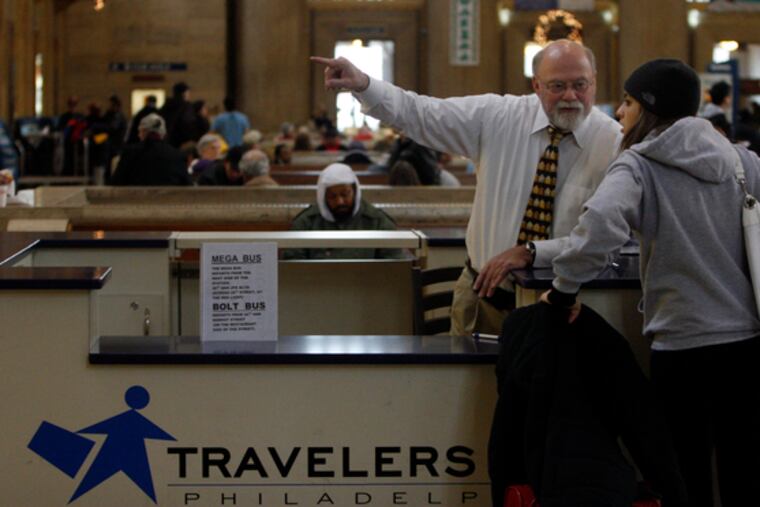Travelers Aid slowed by budget cuts
The older woman arrived in Philadelphia by train on Sunday. Wandering 30th Street Station, she won't tell anyone her name. She won't leave the station.

The older woman arrived in Philadelphia by train on Sunday. Wandering 30th Street Station, she won't tell anyone her name. She won't leave the station.
"She's from somewhere, but she won't say where," said Ted Weerts, executive director of the Travelers Aid Society of Philadelphia.
"She's one of those people who, because of mental illness, travels from place to place," said Weerts, who is trained as a clinical psychologist.
For 107 years, the Travelers Aid Society has been helping people like her by offering temporary shelter, food, and, if need be, a ticket home.
But, starting today, it will not be able to live up to its founding mission of helping stranded travelers.
The nonprofit agency is one of the victims of Philadelphia's budget crisis. The city's Office of Supportive Housing has eliminated $300,000 for the agency - almost all of its budget for emergency help.
Travelers Aid will still run a city-supported shelter for homeless families at the Kirkbride Center in West Philadelphia, as well as other transitional and permanent housing for families. And its volunteers at an information kiosk at 30th Street Station will still answer questions for travelers.
But the agency will close a Center City office and lay off four employees. Weerts said it would only have $30,000 in federal funds to spend on emergency aid to travelers - less than a tenth of its prior budget.
"It's our mission," Weerts said. "We're heartbroken."
Dainette Mintz, a deputy managing director, said Monday that the city's homeless services office had to reduce its budget by 6 percent due to the city's worsening financial condition.
Because of the persistently high number of people living in shelters and on the street, she said, the office made it a priority not to cut emergency shelter beds, focusing instead on services.
Weerts said the society helped about 1,200 people this year, offering $80,000 in such direct services as hotel costs, food and transportation. They represent a pocket of people overlooked by the city's shelter system. Because of state funding rules, only people who have lived in Philadelphia for at least 30 days are allowed entry to city shelters.
Among those assisted were:
An elderly couple from Lancaster who returned to Philadelphia to live but could not get into a shelter because they were nonresidents. Travelers Aid put them up for two weeks in a hotel until their next Social Security checks arrived and they could find a place on their own.
A mother of five from Minnesota who moved back with relatives until they asked her to move out because of her family's size. Travelers Aid found shelter for the woman in Minnesota, and paid for her and her children to return.
An abused woman whose partner tracked her down at a shelter here. Travelers Aid covered the costs for her to relocate to another facility in New York.
"Without emergency transportation and housing provided by Travelers Aid, these people would be stuck in the streets," said Monique French-Brown, director of emergency services for Travelers Aid.
The Travelers Aid Society of Philadelphia was founded in 1901 as part of a national movement that started in St. Louis in 1851 to help immigrants heading west in the Gold Rush.
Local volunteers went to train stations to help arriving immigrants, especially young women who might otherwise be recruited to work in brothels.
The mission of the society has evolved. During the Depression, the focus was on helping people wandering from city to city in search of work. After World War II, the society served returning veterans.
In the 1980s, the mandate shifted again to meet the growing needs of homeless residents.
Weerts said that since 1990 the society has focused more on sheltering local homeless families and will spend $4.5 million in the year ahead to house them.
He said he hoped the agency would be able to resume its aid to travelers in the future.
But for now, it will not be able to help someone like the 84-year-old Florida man in a wheelchair who sought help at 30th Street Station last September.
The man had taken the train from Miami to Atlantic City through Philadelphia. He gambled hard, and returned to 30th Street to catch a train home. But a hurricane canceled train service for days, and he spent all his money.
Travelers Aid put him up at a hotel near the airport for three nights. When the man returned home, he mailed the society a check to cover all its costs.
Weerts said he was not entirely surprised that when the city went looking for budget cuts, it would look at money spent on services to people not from the city.
Of this small group, he said: "They're out of luck."
.